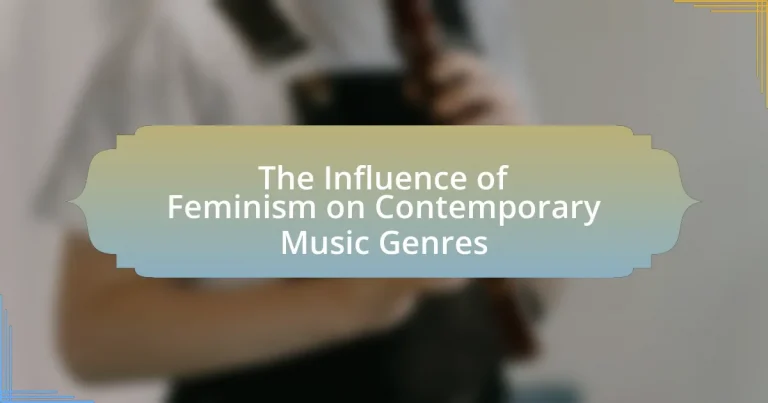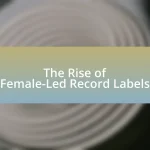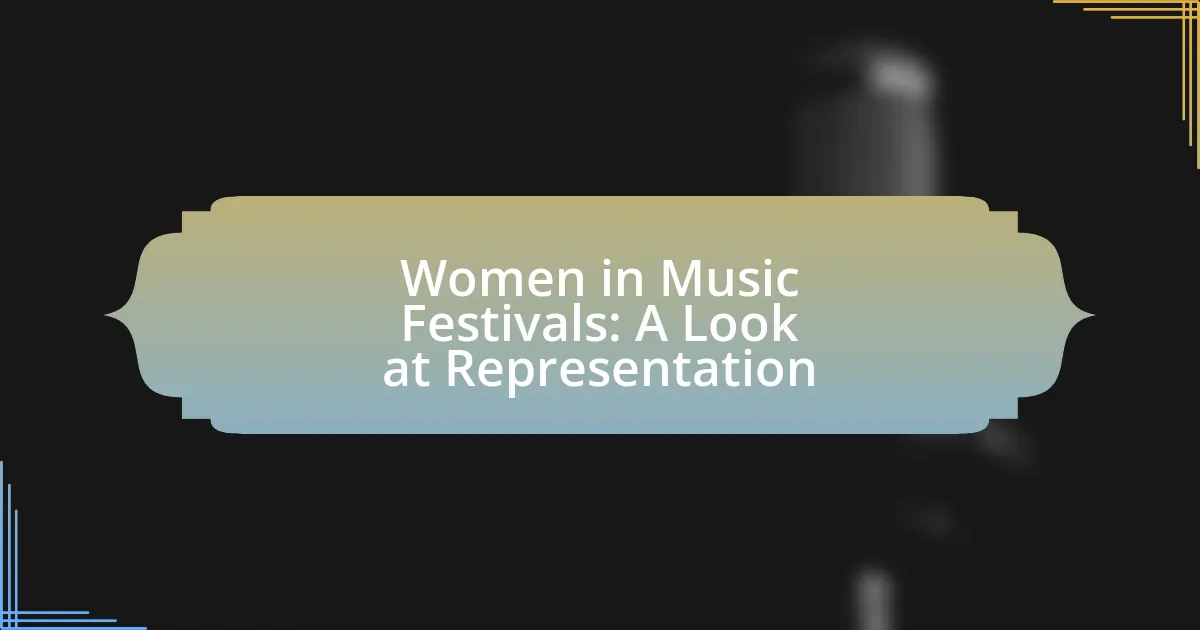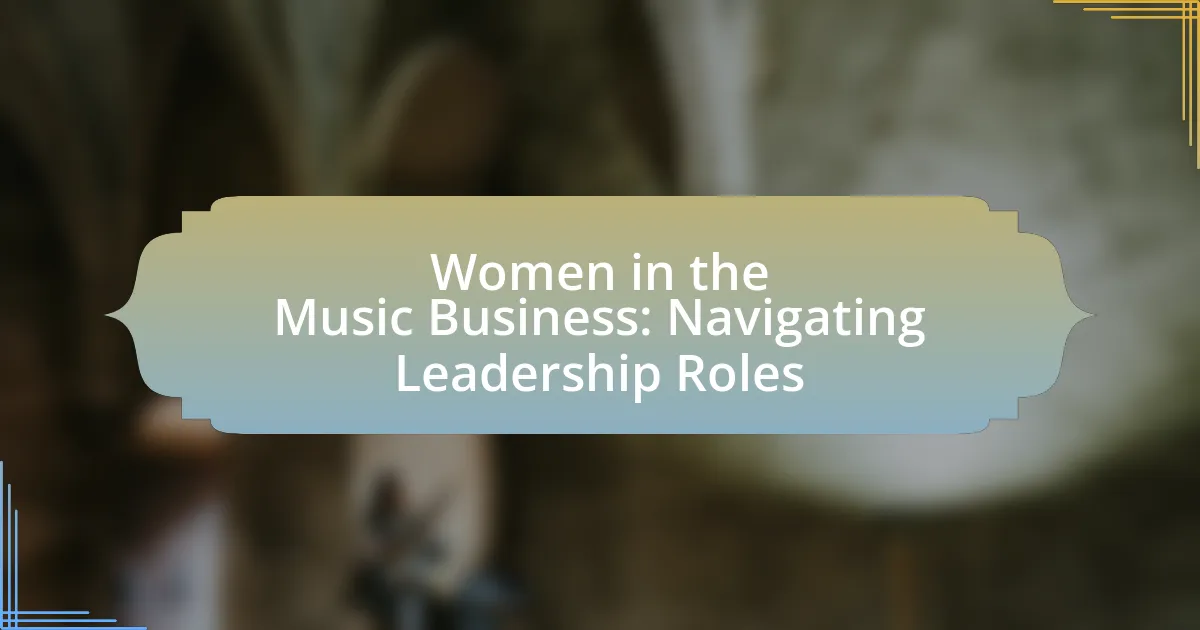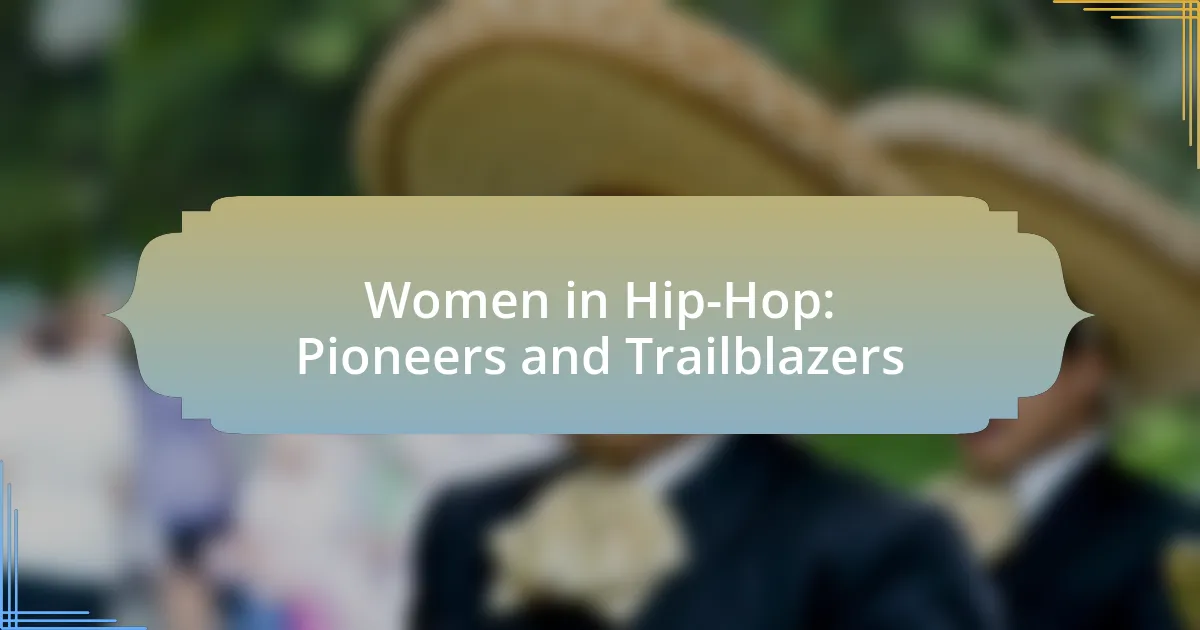The article examines the significant influence of feminism on contemporary music genres, highlighting how the movement promotes gender equality and empowers female artists across various styles, including pop, rock, hip-hop, and country. It discusses historical movements that have shaped this influence, such as the women’s suffrage and civil rights movements, and explores how female artists challenge traditional norms through their lyrics and public personas. Key themes of feminism in music, such as empowerment, body positivity, and gender equality, are analyzed, along with the importance of representation and intersectionality in shaping feminist narratives. The article also addresses the future implications of feminism in music and the role of emerging artists in continuing this legacy.
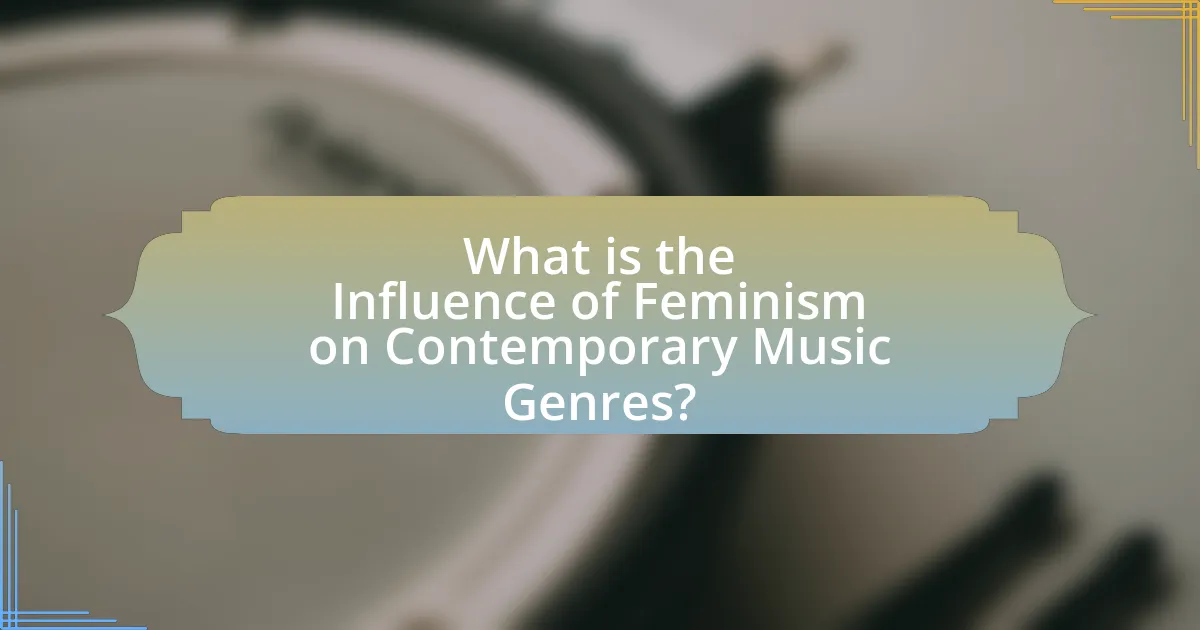
What is the Influence of Feminism on Contemporary Music Genres?
Feminism significantly influences contemporary music genres by promoting gender equality and empowering female artists. This movement has led to the emergence of diverse voices in genres such as pop, rock, hip-hop, and country, where women challenge traditional gender roles and express their experiences. For instance, artists like Beyoncé and Taylor Swift use their platforms to address issues like sexism and body positivity, reflecting feminist ideals. Additionally, the #MeToo movement has sparked conversations about consent and harassment in the music industry, further shaping lyrical content and artist collaborations. This influence is evident in the increasing representation of women in music production and songwriting, which historically were male-dominated fields.
How has feminism shaped the evolution of music genres?
Feminism has significantly shaped the evolution of music genres by promoting gender equality and empowering female artists, which has led to the emergence of diverse musical expressions. The feminist movement has challenged traditional gender roles within the music industry, resulting in increased visibility for women in genres such as rock, hip-hop, and pop. For instance, the Riot Grrrl movement in the 1990s combined punk music with feminist ideology, giving rise to bands like Bikini Kill and Sleater-Kinney, which addressed issues like sexism and body autonomy. Additionally, artists like Beyoncé and Taylor Swift have used their platforms to advocate for women’s rights, influencing mainstream music and encouraging discussions around feminism. This shift has not only diversified the sound and themes of contemporary music but has also fostered a more inclusive environment for future generations of female musicians.
What historical movements contributed to the feminist influence in music?
The feminist influence in music has been significantly shaped by several historical movements, including the women’s suffrage movement, the civil rights movement, and the second-wave feminism of the 1960s and 1970s. The women’s suffrage movement, which fought for women’s right to vote, laid the groundwork for women’s rights activism, promoting the idea of gender equality that permeated various cultural spheres, including music. The civil rights movement further inspired feminist musicians to address issues of race and gender, leading to a more inclusive approach in music. Second-wave feminism specifically challenged traditional gender roles and advocated for women’s representation in all areas, including the music industry, resulting in the emergence of female artists who expressed their experiences and struggles through their work. These movements collectively fostered an environment where women’s voices in music could be amplified and celebrated.
How have female artists challenged traditional music norms?
Female artists have challenged traditional music norms by redefining genre boundaries, addressing social issues, and asserting their autonomy in creative expression. For instance, artists like Madonna and Beyoncé have incorporated feminist themes into their music, promoting empowerment and challenging gender stereotypes. Additionally, the emergence of genres such as Riot Grrrl in the 1990s, led by bands like Bikini Kill, directly confronted misogyny in the music industry and society. This movement emphasized female empowerment and encouraged women to take control of their narratives. Furthermore, contemporary artists like Billie Eilish and Lizzo continue to disrupt conventional expectations by embracing authenticity and body positivity, thereby reshaping the music landscape. These actions collectively illustrate how female artists have not only influenced music but also instigated broader cultural conversations around gender and identity.
What are the key themes of feminism in contemporary music?
Key themes of feminism in contemporary music include empowerment, body positivity, and gender equality. Empowerment is often expressed through lyrics that encourage self-confidence and independence, as seen in songs by artists like Beyoncé and Lizzo. Body positivity challenges societal beauty standards, with artists promoting acceptance of diverse body types, exemplified by songs from Meghan Trainor and Janelle Monáe. Gender equality is highlighted through critiques of misogyny and calls for equal representation in the music industry, as demonstrated by the works of artists like Taylor Swift and Billie Eilish. These themes reflect a broader cultural shift towards recognizing and addressing women’s rights and experiences in society.
How do lyrics reflect feminist ideologies?
Lyrics reflect feminist ideologies by promoting themes of gender equality, empowerment, and challenging traditional gender roles. Many contemporary songs articulate women’s experiences, advocate for their rights, and critique societal norms that perpetuate inequality. For instance, artists like Beyoncé in “Run the World (Girls)” emphasize female strength and independence, while songs like “You Don’t Own Me” by Lesley Gore challenge patriarchal control. These lyrics serve as a platform for feminist discourse, encouraging listeners to question and confront gender-based injustices.
What role does representation play in music videos and performances?
Representation in music videos and performances plays a crucial role in shaping cultural narratives and influencing societal perceptions. It allows artists to express diverse identities, challenge stereotypes, and promote inclusivity, thereby reflecting the complexities of gender, race, and sexuality. For instance, the rise of feminist artists in contemporary music has led to increased visibility for women and marginalized groups, as seen in the works of artists like Beyoncé and Lizzo, who use their platforms to address issues of empowerment and body positivity. This representation not only resonates with audiences but also fosters a sense of belonging and validation among underrepresented communities, reinforcing the importance of diverse voices in the music industry.
Why is the intersectionality of feminism important in music?
The intersectionality of feminism is important in music because it addresses the diverse experiences and identities of women, particularly those affected by multiple forms of discrimination, such as race, class, and sexuality. This approach enriches musical narratives and promotes inclusivity, allowing for a broader representation of women’s voices in the industry. For instance, artists like Beyoncé and Janelle Monáe incorporate themes of race and gender in their work, highlighting how these intersecting identities shape their experiences and artistic expressions. Research by the University of Southern California’s Annenberg Inclusion Initiative found that women of color are significantly underrepresented in popular music, emphasizing the need for intersectional feminism to advocate for equitable opportunities and recognition in the music industry.
How do race and class intersect with feminist themes in music?
Race and class intersect with feminist themes in music by shaping the narratives and experiences expressed in songs, highlighting the unique struggles faced by women of different racial and socioeconomic backgrounds. For instance, artists like Beyoncé and Lizzo incorporate their experiences as Black women navigating both sexism and racism, thereby illustrating how these intersecting identities influence their music and messages. Research shows that Black women in music often address issues such as systemic oppression and body positivity, which resonate with broader feminist movements while also emphasizing the specific challenges related to race and class. This intersectionality is crucial for understanding the diverse perspectives within feminist themes in contemporary music, as it reflects the multifaceted realities of women’s lives across different social strata.
What impact does LGBTQ+ representation have on feminist music narratives?
LGBTQ+ representation significantly enriches feminist music narratives by broadening the scope of identity and experience within the genre. This inclusion allows for a more diverse exploration of themes such as gender, sexuality, and empowerment, which are central to feminist discourse. For instance, artists like Hayley Kiyoko and Janelle Monáe incorporate LGBTQ+ perspectives in their lyrics and performances, challenging traditional gender norms and advocating for intersectionality. Research indicates that music featuring LGBTQ+ themes can foster a sense of belonging and validation among marginalized communities, thereby enhancing the overall impact of feminist messages in contemporary music.
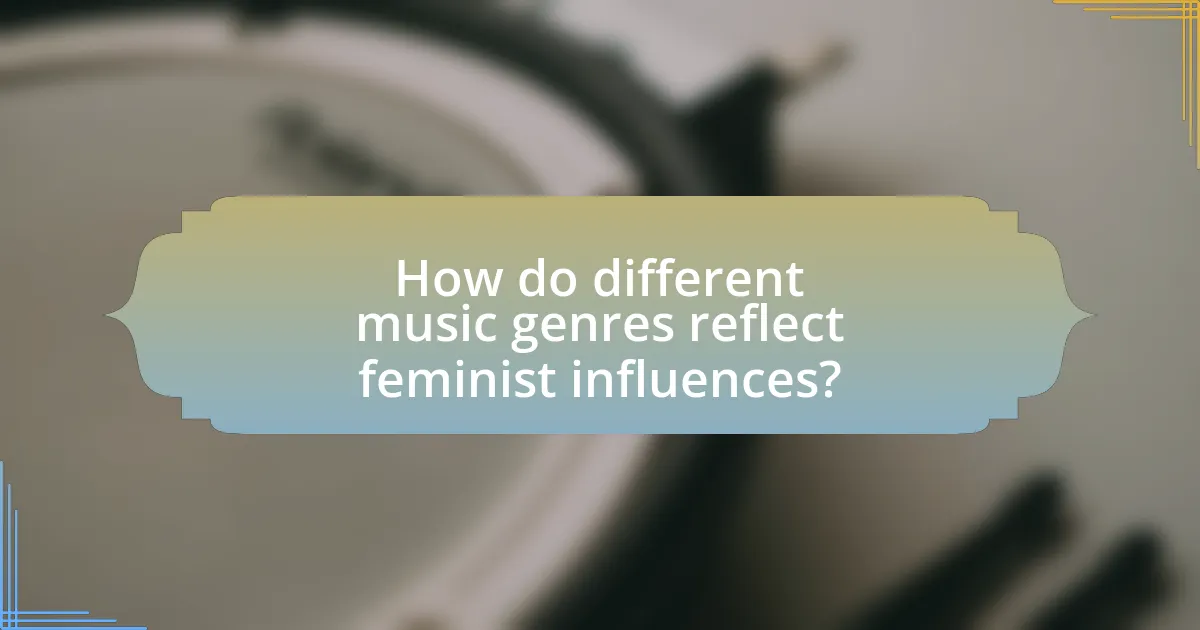
How do different music genres reflect feminist influences?
Different music genres reflect feminist influences through their lyrics, themes, and the roles of female artists. For instance, punk rock often embodies feminist ideals by challenging societal norms and advocating for women’s rights, as seen in the works of bands like Bikini Kill, which pioneered the Riot Grrrl movement in the 1990s. Similarly, hip-hop has seen a rise in female artists like Nicki Minaj and Cardi B, who assert their sexual agency and challenge misogyny within the genre, contributing to discussions about gender equality. Additionally, pop music has embraced feminist messages, with artists like Beyoncé and Taylor Swift using their platforms to address issues such as empowerment and sexual harassment. These examples illustrate how various genres not only reflect feminist influences but also actively participate in the discourse surrounding gender equality and women’s rights.
What are the feminist contributions in pop music?
Feminist contributions in pop music include the promotion of gender equality, the empowerment of female artists, and the challenge of traditional gender roles. Artists like Madonna and Beyoncé have used their platforms to advocate for women’s rights and sexual autonomy, influencing societal perceptions of femininity. For instance, Madonna’s 1984 hit “Like a Virgin” challenged sexual norms, while Beyoncé’s “Flawless” incorporates the feminist mantra “I woke up like this,” emphasizing self-acceptance and confidence. Additionally, the #MeToo movement has led to increased awareness of sexual harassment in the music industry, prompting artists to speak out against injustices. These contributions have reshaped the landscape of pop music, making it more inclusive and reflective of women’s experiences.
How have pop icons used their platform for feminist advocacy?
Pop icons have utilized their platforms for feminist advocacy by addressing gender inequality, promoting women’s rights, and challenging societal norms through their music and public personas. For instance, artists like Beyoncé have incorporated feminist themes in songs such as “Flawless,” which includes a sample of Chimamanda Ngozi Adichie’s TED Talk on feminism, thereby amplifying feminist discourse. Similarly, Taylor Swift has spoken out against sexual assault and advocated for women’s rights, notably in her “You Need to Calm Down” music video, which supports LGBTQ+ rights and promotes inclusivity. These actions demonstrate how pop icons leverage their visibility to influence cultural conversations around feminism, making significant impacts on public awareness and advocacy efforts.
What are notable feminist anthems in pop music history?
Notable feminist anthems in pop music history include “Respect” by Aretha Franklin, “I Will Survive” by Gloria Gaynor, and “Fight Song” by Rachel Platten. “Respect,” released in 1967, became a rallying cry for both the feminist and civil rights movements, emphasizing the demand for dignity and equality. “I Will Survive,” released in 1978, is celebrated for its themes of empowerment and resilience following a breakup, resonating with many women. “Fight Song,” released in 2015, serves as an anthem of personal empowerment and determination, encouraging listeners to overcome obstacles. These songs have significantly influenced the feminist movement and continue to inspire generations.
How is feminism represented in rock and alternative music?
Feminism is represented in rock and alternative music through the empowerment of female artists, the challenge of gender norms, and the promotion of social justice themes. Female musicians like Joan Jett, Courtney Love, and more recently, artists like Halsey and Billie Eilish, have used their platforms to address issues such as sexism, body positivity, and reproductive rights. For example, the Riot Grrrl movement of the 1990s, which included bands like Bikini Kill and Sleater-Kinney, explicitly combined punk rock with feminist ideology, advocating for women’s rights and challenging patriarchal structures within the music industry. This representation has led to a broader acceptance of diverse gender identities and has encouraged discussions about equality and representation in music.
What role did female rock musicians play in the feminist movement?
Female rock musicians played a crucial role in the feminist movement by challenging gender norms and advocating for women’s rights through their music and public personas. Artists like Joan Jett, Patti Smith, and the Riot Grrrl movement of the 1990s used their platforms to address issues such as sexual liberation, body autonomy, and gender equality. For instance, the song “Bad Reputation” by Joan Jett became an anthem for female empowerment, promoting the idea that women should not be judged by societal standards. Additionally, the Riot Grrrl movement, which included bands like Bikini Kill, emphasized feminist punk ideology, encouraging young women to express themselves and confront misogyny. This activism not only influenced the music industry but also contributed to broader societal discussions about feminism and women’s rights.
How do lyrics in rock music challenge gender stereotypes?
Lyrics in rock music challenge gender stereotypes by subverting traditional roles and expressing themes of empowerment, sexuality, and independence. For instance, artists like Joan Jett and Courtney Love have used their lyrics to confront societal expectations of femininity, promoting a message of female strength and autonomy. Jett’s anthem “Bad Reputation” explicitly rejects the notion of conforming to societal norms, while Love’s work often critiques patriarchal structures. These examples illustrate how rock music serves as a platform for challenging and redefining gender roles, reflecting broader feminist movements within society.
What is the significance of feminism in hip-hop and rap?
Feminism in hip-hop and rap is significant as it challenges gender stereotypes and promotes female empowerment within a traditionally male-dominated genre. Artists like Queen Latifah and Missy Elliott have used their platforms to address issues such as sexism, body positivity, and women’s rights, reshaping the narrative around female representation in music. For instance, Queen Latifah’s song “U.N.I.T.Y.” explicitly confronts misogyny and advocates for respect towards women, illustrating how feminist themes can influence lyrical content and cultural perceptions. This movement has led to increased visibility for female artists and has encouraged a broader dialogue about gender equality in the music industry.
How have female rappers redefined the genre’s narrative?
Female rappers have redefined the genre’s narrative by challenging traditional gender roles and asserting their identities through their lyrics and public personas. Artists like Nicki Minaj, Cardi B, and Megan Thee Stallion have brought themes of empowerment, sexuality, and independence to the forefront, reshaping the conversation around women’s experiences in hip-hop. For instance, Cardi B’s hit “Bodak Yellow” not only topped charts but also highlighted her rise from humble beginnings to success, emphasizing self-empowerment. Additionally, Megan Thee Stallion’s “Hot Girl Summer” became a cultural anthem celebrating female autonomy and confidence. These artists have not only gained commercial success but have also influenced the genre’s narrative by promoting a more inclusive and diverse representation of women in hip-hop, thereby altering the landscape of the music industry.
What are the challenges faced by women in the hip-hop industry?
Women in the hip-hop industry face significant challenges, including gender discrimination, sexual objectification, and limited access to opportunities. Gender discrimination manifests in the form of unequal pay and fewer promotional opportunities compared to their male counterparts, as evidenced by studies showing that female artists earn significantly less than male artists in the same genre. Sexual objectification is prevalent, with women often being portrayed in a way that emphasizes their physical appearance over their artistic contributions, which can undermine their credibility as serious musicians. Additionally, women encounter barriers in networking and industry connections, which are often dominated by male figures, limiting their ability to advance in their careers. These challenges highlight the systemic issues within the hip-hop industry that hinder women’s progress and recognition.
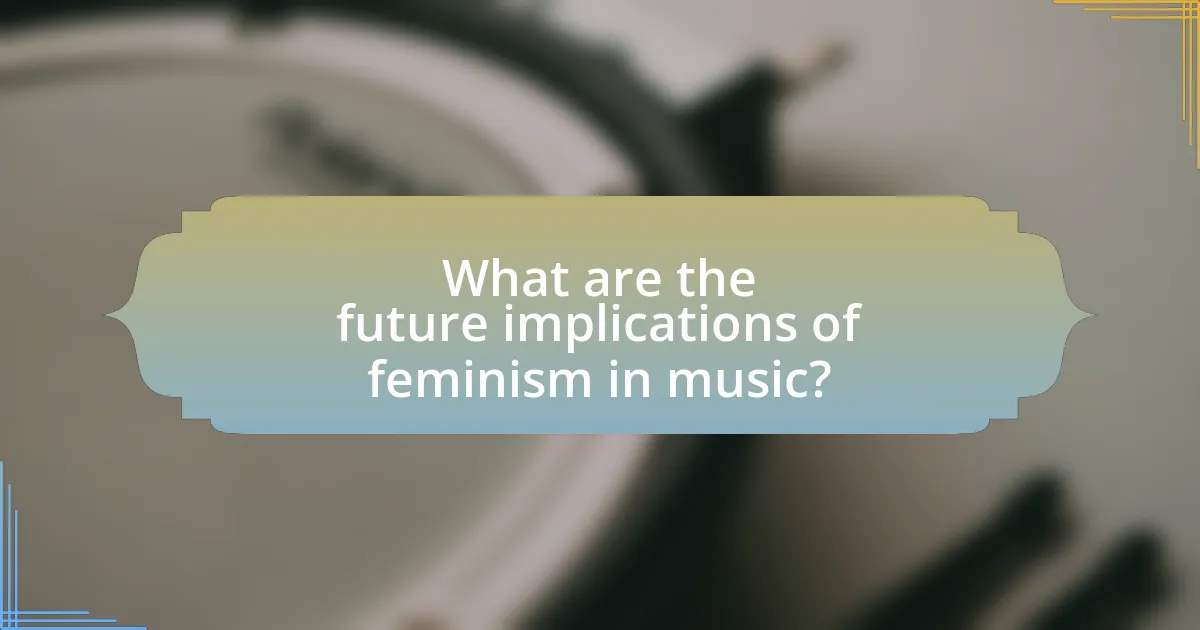
What are the future implications of feminism in music?
The future implications of feminism in music include increased representation of women and marginalized voices, leading to a more diverse and inclusive music industry. As feminist movements continue to advocate for equality, artists are likely to challenge traditional gender norms and stereotypes, resulting in innovative musical expressions and themes. For instance, the rise of female-led genres such as pop, hip-hop, and rock has already transformed the landscape, with artists like Billie Eilish and Lizzo gaining prominence. This shift not only empowers female musicians but also influences the narratives and messages conveyed in music, promoting social change and awareness around issues like body positivity and gender equality. The ongoing dialogue around feminism in music is expected to foster collaborations across genres and cultures, further enriching the artistic landscape.
How can emerging artists continue the feminist legacy in music?
Emerging artists can continue the feminist legacy in music by actively promoting gender equality and representation in their work. This can be achieved through creating music that addresses women’s issues, collaborating with female musicians, and using their platforms to advocate for women’s rights. For instance, artists like Billie Eilish and Lizzo have incorporated feminist themes into their lyrics and public personas, thereby influencing a new generation of musicians. Additionally, statistics show that female representation in music has been historically low; thus, emerging artists can help rectify this by ensuring diverse voices are heard and celebrated in their projects.
What platforms are available for feminist voices in music today?
Feminist voices in music today can be amplified through various platforms, including social media, streaming services, and dedicated music festivals. Social media platforms like Instagram and Twitter allow artists to share their messages and connect with audiences directly, fostering community and activism. Streaming services such as Spotify and Apple Music have curated playlists that highlight female artists and feminist themes, increasing visibility. Additionally, music festivals like Lilith Fair and SheFest specifically focus on promoting women in music, providing a stage for feminist voices. These platforms collectively contribute to a more inclusive music industry, supporting the representation of diverse female perspectives.
How can audiences support feminist music initiatives?
Audiences can support feminist music initiatives by actively engaging with and promoting female artists and feminist-themed music. This includes attending concerts, purchasing music, and sharing content on social media platforms to increase visibility. Research indicates that female musicians often face systemic barriers in the music industry; for instance, a 2020 study by the Annenberg Inclusion Initiative found that only 22.4% of artists in popular music were women. By prioritizing and amplifying the work of these artists, audiences can help challenge these disparities and foster a more inclusive music landscape.
What best practices can artists adopt to promote feminism in their work?
Artists can promote feminism in their work by incorporating themes of gender equality, representation, and empowerment into their creative expressions. This can be achieved through the portrayal of strong female characters, addressing social issues related to women’s rights, and collaborating with female artists to amplify diverse voices. For instance, artists like Beyoncé and Janelle Monáe have effectively used their platforms to challenge gender norms and advocate for women’s rights through their lyrics and visuals. Additionally, participating in feminist art movements and supporting organizations that promote gender equality can further enhance their impact.
How can collaboration among artists enhance feminist messages?
Collaboration among artists can enhance feminist messages by creating a multifaceted platform that amplifies diverse voices and perspectives. When artists from various backgrounds unite, they can combine their unique experiences and insights, resulting in richer narratives that resonate more deeply with audiences. For instance, projects like the “Women’s March on Washington” music compilation featured contributions from multiple female artists, showcasing a range of feminist viewpoints and fostering a sense of solidarity. This collective effort not only broadens the reach of feminist messages but also encourages dialogue and awareness around gender issues, ultimately strengthening the impact of the feminist movement in contemporary music genres.
What role does social media play in spreading feminist music narratives?
Social media plays a crucial role in spreading feminist music narratives by providing platforms for artists to share their work and connect with audiences. These platforms enable musicians to bypass traditional gatekeepers, allowing for greater visibility of feminist themes in music. For instance, artists like Billie Eilish and Lizzo have utilized social media to amplify messages of body positivity and gender equality, reaching millions of followers and fostering community discussions. Research indicates that social media engagement can significantly increase the reach and impact of feminist messages, as seen in campaigns like #MeToo, which have influenced music and culture.
